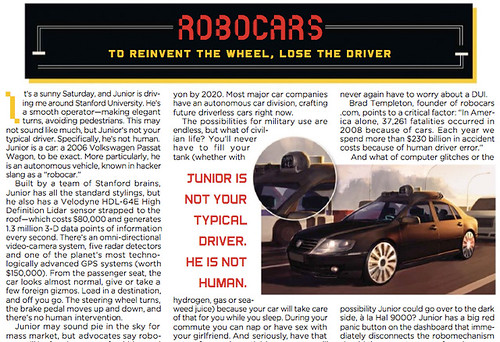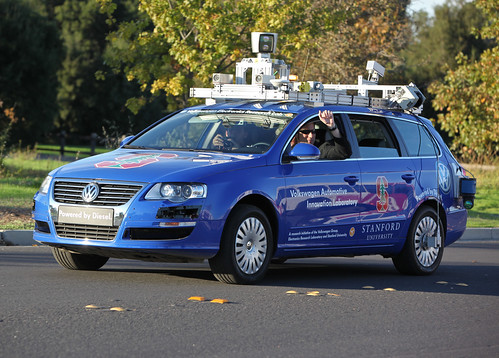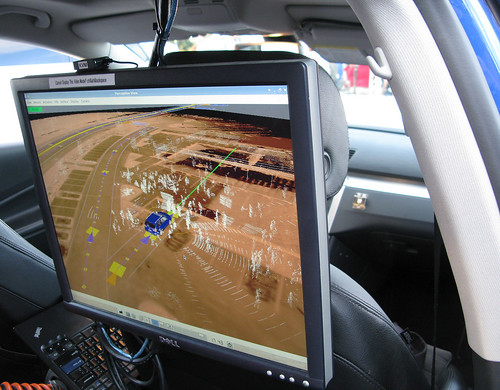![]()
So I was reading through the new issue of Playboy magazine that came last week when I came upon an article entitled 15 Innovations That Will Change the World. Some pretty impressive ideas, but the one that stood out for me was “Robocars,” cars that drive themselves using sophisticated sensors, omni-directional video-cameras, radar detectors and advanced GPS systems.

But what really surprised me was this. “[A]dvocates say robocars will be ferrying many of us hither and yon by 2020. Most major car companies have an autonomous car division, crafting future driverless cars right now.” Holy crap, we’re only a decade away from robocars! Even with them most likely being too pricey initially for most people, give them another ten years after introduction for the price to come down, and that means a majority of us will be able to afford them. That would mean in just twenty years it’s conceivable few people will be doing their own driving anymore.
That could mean the end of drunk driving, mobile phone distractions and all manner of driver error accidents. It’s somewhat surprising given how much potential there is for robocars to virtually eliminate DUIs that the anti-alcohol groups have been completely silent about them. Instead, MADD is pushing the ridiculous ignition lock technology. Why aren’t they supporting robocars? Why aren’t they and the other non-profits supposedly committed to curbing drunk driving and keeping the roads safer funding research into the technology to make robocars a reality even sooner?
That’s not a rhetorical question, I really want to know why they’re not doing more to support robocar technology. Could it be so cynical a reason as it would make them irrelevant and make it almost impossible for them to raise money? If I’ve learned anything about non-profits lately it’s that they’ve become permanent institutions whose paid employees are actually no longer incentivized to carry out their organization’s mission to its conclusion because doing so would put themselves out of work in the process. When was the last time a disease or societal problem was actually solved and/or eradicated? Polio? Small Pox? Yet there are so many more non-profits compared to thirty plus years ago, when I was a kid. But the only thing they seem effective at is creating scary statistics and propaganda to make whatever the issue is as dire as possible and raising money.
But back to the Robocars, meet Junior:

Junior, a self-driving prototype, created using a mostly stock 2006 Volkswagen Passat, which is the same car I drive, though mine’s a few years older and doesn’t include an autopilot, sad to say.
VW is financing the creation of both Junior and his brother Stanley at Stanford’s Volkswagen Automotive Innovation Lab, and the car company is funding VAIL, too. The research center was dedicated last year.

Inside the back of Junior.

Inside the back seat of Junior.
And below is a video of one of Junior’s test drives.
Frankly, I can’t wait until the day I can stop driving and leave it to the computers. I’ll be able to drink more without having to worry at all, especially about the draconian laws associated with drinking and driving. They should be a thing of the past, though I imagine one or two groups will fight this new technology tooth and nail. Police and local governments will most likely hate this, because it will remove one of their biggest revenue streams. I’m willing to bet they’ll question the “safety” of the robot drivers and try to block their implementation as long as humanly possible.
But apart from that, this seems like it would be the proverbial win-win for everybody else. Brewers along with bars and restaurants that serve it would likely see a dramatic rise in business without the chilling effect of our current laws and lack of viable mass transit alternatives. In theory they could even save money by no longer having to spend marketing dollars on those “drive responsibly” campaigns.
MADD and the other anti-alcohol organizations should be in favor of it because it would literally eliminate drunk driving for everyone who purchases one of the Robocars. Unfortunately, I believe that some of the anti-alcohol folks, and especially MADD, are not really interested in stopping drunk driving, but instead have shifted their focus to eliminating alcohol altogether. Of course, that will also stop drunk driving, too, but at the expense of destroying so much more: the economy, people’s livelihoods, the health advantages of moderate drinking, quality of life and simply enjoying a drink.
But watching the actions and policy decisions of these groups for as long as I have, I honestly think they’d prefer that result to one which would actually eliminate needless deaths while keeping the alcohol industry intact and even benefiting its business. None that I’m aware of have ever done anything to encourage or support alternate modes of transportation such as building mass transit infrastructure as a way of keeping people who’ve been drinking off the roads. Between that and their silence on Robocars it makes it hard not to at least question their true motives. With the very real possibility that drunk driving could be eliminated 100% in just twenty years (or less) it seems reasonable to expect that supporting that technology would at least be part of their policy and/or strategy. That they don’t, I think, speaks volumes. Show me the Robocars!

Jay, I was speaking with a big cheese at MADD in Dallas a few months ago when the Google robocar was in the news, he said that they are looking into the possibility of robocars reducing drunk driving, but the technology on that is so far off that they will push ignition interlocks in the meantime. Also, even if robocars are foolproof I would bet that they won’t let you ‘drive’ them intoxicated in the event the autopilot disengages.
Interlocks work in reducing drunk driving but I have a serious problem giving a machine power over what I can do with a vehicle (what if I cut my finger off at my ranch where there is no ambulance service but can’t get to the hospital because my car thinks I’m too tipsy to save myself from bleeding to death?) In practical terms, interlocks will also put many if not most bars out of business.
Of course, as you say, once robocars become ubiquitous, MADD ceases to have a reason to exist. I can’t wait for that day. And once you can drink to your heart’s content and let your car take you home, think of what will happen with beer sales? A-B, Diageo, and MillerCoors ought to fund the research.
That’s what struck about the Playboy report, that it may only be ten years away. That doesn’t seem like so long anymore. And frankly, I can’t say that I like the fact that MADD wouldn’t want to at least support a technology that would actually solve the issue that caused them to be created just because it might take some time. They wouldn’t have to put all their eggs in the Robocar basket, but it sure seems like if they really do care about what they purport, that Robocars practically demand their support. I continue think they’re refusal to do so is telling.
And you’re right, I do agree that the alcohol companies have a vested interest in Robocars, too, and should likewise be supporting their development. Also, restaurant associations and similar trade groups, too. I’ve long thought one of the solutions that’s been ignored is building a viable mass transit system like Europe enjoys as a way to keep people from driving, but that’s obviously very, very expensive and most likely there isn’t the political will for it. Plus, people in America “love” their cars. So this seems like such an elegant, less expensive, solution. Damn, I want my Robocar now!
Man, look on MADD’s website – they are leading and pushing for the research on drunk driving-proof cars.
Dude, I’m looking, but I don’t see word one about Robocars. Not even a search reveals one hit. Unless you’re talking about ignition locks, which are are a terrible idea. They’re not the same thing. You did read what I wrote, didn’t you?
Harry:
Oh good Lord, the worst “what if” excuse ever. What happens if I cut my finger off and have to drive to the hospital? Have you ever called 911?
Jay: It’s your choice to live in a place where you have to drive to reach an excellent pub or two or five. I live in a city where great pubs are a fifteen minute walk in any direction. This is my choice.
And seriously, are you really that paranoid that you would believe an advocacy group would work against robocars simply because it would put them out of business? What a weird, dark, nasty vision of the world you must have.
Perhaps you should put the beer down before you post again.
I’ll let Harry defend himself, but there are plenty of other examples why ignition locks are a bad idea and driverless cars would be a better solution. But I still can’t help but ask. What would be quicker: waiting for an ambulance to come and then transport an injured person to a hospital – or – driving there yourself?
But as to my “choice” of where to live, I’d say most of America is devoid of decent, useful, viable mass transit. Certainly, everywhere I’ve lived execpt for New York City did not have a decent mode of public transit (and I’ve lived in several states and towns over the years). So just because I “choose” to not live in your city that means I shouldn’t expect the situation to better? I just have to accept my “choice” and that’s it? To bad for me? Maybe it’s you who should put down the beer, because that’s a pretty awful way of looking at things, too. And not a little bit insulting. Don’t like your situation, then just move. Don’t try to change things if there are problems, just get the hell out and go somewhere else. And for goodness sake, don’t complain about it. Nice advice.
Yes I do, welcome to my world. I’m sorry to say I don’t find it that weird. I really do think non-profit organizations of all stripes have become institutions that don’t want to put themselves “out of business,” so to speak. That’s not paranoia, it’s common sense. What motivates most people? Self-interest. I’ve watched all manner of well-intentioned groups start up with the best of intentions only to grow so large that they’re really no different from any other corporation. If you don’t think charitable organizations have become big business, you’re just not paying attention. There’s a veritable charity industry, with all sorts of support businesses, ranking groups, research arms, schools to teach fund-raising, and on and on. Executive salaries for the largest charities are huge, and they spend lavishly on themselves, parties, etc. Remember that United Way scandal in the early 90s? It’s not nasty if it’s true, sad to say. There are universities offering majors in “nonprofit management” and “non-profit/public/organizational management.” There are professional fund raisers and people who go from non-profit to non-profit just to get a bigger paycheck with little thought of whether the charity they’ll represent is one they believe in. Maybe things are rosier in your version of the world, but that’s really what goes in the world today. I wish it were otherwise, but it’s not.
In the future MADD will change their name to more accurately describe their real agenda: MEAD. Mothers Against Any Drinking. Ironically, the new acronym will launch a vast new interest and in the ancient art of mead brewing, leading to a huge new alcohol industry!
Certainly an interesting bit of technology. Sorta reminds me of the autopilot function on large commercial aircraft. What I look forward to learning is whether the human “driver” will be able to override the on-board computer (like Boeing airplanes) or will the computer have the final say (sorta like Airbus).
For the nonce, forget the glitz/glamor/expense & concentrate on the practical side of this great idea:
1. The “users” of each vehicle will have to program the “brains” of the car w/some basic stuff (the techno-incompetent will have to hire someone to do it).
2. Manual override SHOULD be subject to well-defined conditions: “breathalyzer” is “LAST CHANCE” if someone can’t remember password as choice 1, “mission” (as in pre-programmed destinations in sequence) 2nd, & maybe 1 or 2 more that can be added once you’re into auto-drive & don’t yet want to go home).
3. If auto-drive function fails once turned on, then 4-way flashers turn on & manual kicks in automatically. Laws MUST allow for such – there MUST BE a “black box” in the least-likely place to be accident-damaged (I’m thinking below the center console & inaccessible to the owner/driver) that tells the tale, & which is electronically accessible. The DWI “offender” with good intentions then has a chance to get off the hook. A person who starts manual & sober & forgets to switch back to “autopilot” is SOL, as the “black box” tells the tale.
4. Before “robocars” hit the streets, hardware/software/sensors have to be shrunk & hidden in the car designs to be ding-proof & give owners normal “trunk space”.
I love the concept & would volunteer in a heartbeat to write the user manual (in simple, easily understood & translatable English)in exchange for one of those cars once they’re in production. My conditions:
1. $500/day (hrs/day irrelevant – I’m paid back end); minimum 90 days to talk w/the geeks & observe/participate in all “beta” tests.
2. Once the product is up for sale, I get open-end lease offset against my $45K+ credits; once that’s gone, I pay out of pocket.
Jay – I filled in the CAPTCHA code BEFORE I wrote my comment; had to go thru that BS again afterward